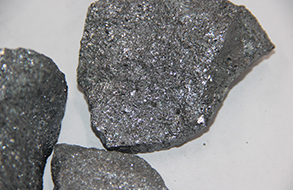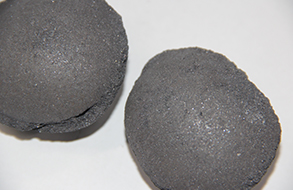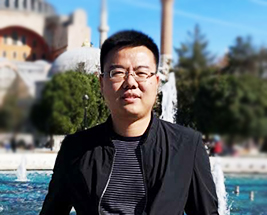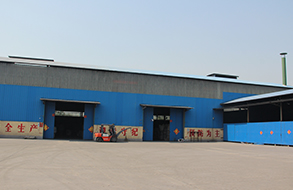Customized ferrosilicon lump to stand out amid competition
----Interview with Mr. Liu Hu
General Manger
Henan Xinxin Silicon Industry
- Starting out by smelting ferrosilicon dregs, Xinxin Silicon Industry has engaged in ferrosilicon trading for around 20 years as one of the main ferrosilicon processing traders in Anyang City, Henan province. They have good credits for ferrosilicon quality and stable supply in South America and Japan and other regions.
- Asian Metal: Hello, Mr. Liu. Thank you for accepting our exclusive interview. Would you please introduce your company briefly?
- Mr. Liu: We have engaged in trading ferrosilicon for over 20 years since my father's generation. We started out by smelting ferrosilicon dregs at that time. We mainly focused on Chinese domestic market at the beginning, and started to export ferrosilicon four years ago. Besides common ferrosilicon, we also have high carbon ferrosilicon, silicon calcium, ferrosilicon nodular, silicon nitride and other nitride ferroalloys.
- Asian Metal: How about the monthly trading volume of ferrosilicon, and which countries do your clients come from?
- Mr. Liu: Generally speaking, the total monthly trading volume of ferrosilicon is 5,000t, 60% for domestic market and 40% for overseas market. We mainly export to Japan, South Korea, Southeast Asia, and South America. We have good cooperation relationship with Sojitz Japan. Our current offer of ferrosilicon 75%min (10-50mm) is USD1,200/t CIF main Japanese port (1.1.2019), and most of Japanese clients couldn't accept the price. We can't decrease price due to high purchase cost. We make ourselves stand out by processing special sized ferrosilicon, such as 0.1-0.3mm, 0.3-1.2mm, 1-3mm, 3-10mm, 0.2-0.7mm, which couldn't be done in large-sized ferrosilicon plants in China.
- Asian Metal: Could you be more specific about the processing advantage of your company?
- Mr. Liu: We're located in Anyang, Henan, which is famous for processing trade. We can process ferrosilicon lump into various sized powder according to customized requirements. Generally speaking, major ferrosilicon producers can process natural lump into various sizes like 10-50mm, 50-100mm, 0-3mm and 3-10mm, but major plants' qualified ration of 3-10mm lump is low as many 2-15mm lump are mixed within. We mainly purchase raw materials from Erdos and Junzheng and process them into various sized lump, such as 0-1mm, 1-3mm, 0-0.3mm, 0.3-1.2mm, 0.2-0.7mm. Compared with major ferrosilicon producers, we have no advantage, and we couldn't compete with illegal channels either. We can only survive the competition by taking advantage of differentiation strategy, such as producing ferrosilicon lump of special sizes and elements content.


- Asian Metal: We know that you mainly focus on domestic spot market and export market, and commodity market as well. How can you strike a balance among the three markets and better leverage the opportunity?
- Mr. Liu: Because we have plenty of stocks in hand, it's more flexible for us to switch from the triangle markets and seize more opportunities to lower risks. When commodity market is bearish, we buy spot materials from commodity warehouse and sell them to steel mills and foundries; when it is bullish, we reduce our inventory. Commodity market is becoming the leverage in Chinese market. We see faster monetization and more favorable prices in commodity market compared with export market.
- Asian Metal: The current transaction price has made some minor ferrosilicon plants suspend production. What do you think the further price trend will be like? What's your opinion about major plants' strategy? Do you think they will continue to bully small-sized plants in terms of price?
- Mr. Liu: The price of ferrosilicon 72%min natural lump from Qinghai area was RMB5,300/t (USD790/t) EXW D/A 30 days, and that of ferrosilicon 75%min natural lump was RMB5,600/t (USD835/t). If major plants have stocks, the price is not likely to edge up. However, it's also unlikely for them to lower prices further as they're pursuing (for) higher profit even though they have an obvious advantage in production cost. Additionally, the demand is recovering, and the future price trend still depends on the supply and steel prices. Major plants bullied small plants many years ago but failed as small plants have their own flexibility.
- Asian Metal: How do you evaluate the quality differences among main production areas?
- Mr. Liu: Some casting plants in Asia prefer ferrosilicon with low Al content, such as Ningxia-origin ferrosilicon which, however, is not solid enough. The processing of Ningxia-origin ferrosilicon comes with more powers as by-products compared with that of other areas. Taking Qinghai's ferrosilicon for example, it is more difficult to smash the material manually into standard sizes. Today, the unstable Al content is found in ferrosilicon produced at almost every plant.
- Asian Metal: Have you ever thought about combining production with trading?
- Mr. Liu: Some ferrosilicon plants in Qinghai got loans from us when they set up furnaces, so we can get prices slightly lower than mainstream prices. We don't produce ferrosilicon ourselves as it's not an easy job.
- Asian Metal: Are there any items you're focusing on besides ferrosilicon?
- Mr. Liu: High carbon silicon with silicon 65%min and carbon 15%min, which was widely used for producing high carbon steel materials, accounts for nearly 30% of our main business. Our high carbon silicon has good credit in Japanese market, but we gave up South Korean market due to malign price competition as the export price of high carbon silicon to South Korea has been lower than purchase cost. Japanese clients will calculate the absorptivity, by which it's easy to tell better or worse quality. On the contrary, South Korean clients only focus on prices. As we mentioned before, (some of our products, such as silicon nitride and other nitride alloys, are competitive at prices.
- Asian Metal: What's your forecast on Chinese ferrosilicon domestic and overseas market?
- Mr. Liu: We don't think ferrosilicon demand in first half of 2019 would turn to be strong due to the downward global iron and steel industry. I learned that some companies are applying for the approval of setting up new large capacity furnaces in 2019, so I believe ferrosilicon market would witness oversupply, which would lead to the elimination of some ferrosilicon producers in the market. For export, the government didn't lower export tariff this year, so I believe legal and illegal trading would exist in parallel. It doesn't necessarily mean the legal business will have no space to survive.
- Asian Metal: What's your expectation of your company in 2019?
- Mr. Liu: We will strengthen our business and stay down to earth in 2019. After all, it takes better quality and service for company to stand out amid competition over time. We will promote reliability through diversifying our competitive products, and attend more overseas exhibitions in 2019. Our first stop is Germany.
- Asian Metal: Thank you very much for your time, Mr. Liu, We wish you a thriving business!
- Mr. Liu: Thank you for having me here.




